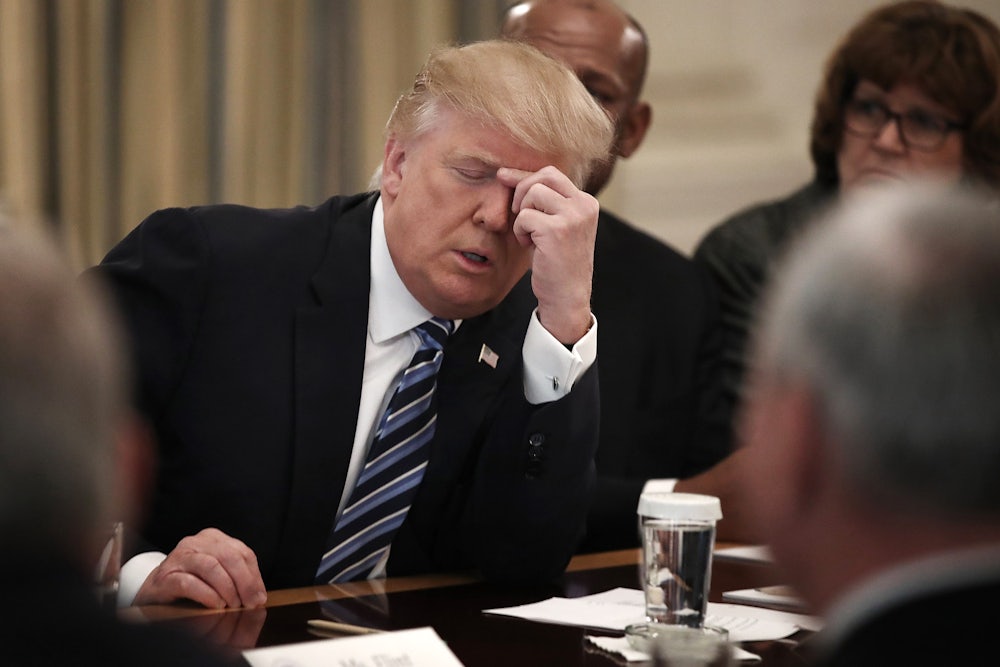It’s hard to imagine a better metaphor for Donald Trump’s presidency than if, backed by a Republican-controlled Congress, he celebrates his 100th day in office by shutting down his own government. This outcome is by no means inevitable, but the odds of it are astonishingly high: Government funding expires Friday, and Trump hits the 100-day mark on Saturday.
It is unprecedented in the modern era for an appropriations fight to end in a government shutdown when one party has full control—or really under any configuration other than when the president is a Democrat and Republicans control at least one chamber in Congress. The current partisan alignment should effectively preclude a shutdown, but Trump’s particular mix of incompetence, narcissism, and poor judgment is potent enough to confound basic game theory. As in so many realms of public affairs, Trump’s mere presence creates massive amounts of uncertainty.
To see how Trump changes the normal calculation, consider what the appropriations process would look like in a more generic case, where Republicans enjoyed identical congressional majorities but under a president who behaved rationally.
In that case, we would expect the president and GOP leaders to work backwards from a desire to avoid a shutdown, toward an optimal outcome in which appropriations did not lapse and Congress funded as many of their priorities as possible. The hard fact that funding the government almost always requires a measure of bipartisanship places a fairly firm limit on what’s possible in that context. The minority party has a disproportionate amount of power over annual appropriations, but you go to the spending fight with the army you have, not the army you might want, or wish to have at a later time. If Democrats were horribly recalcitrant, they could reject every single Republican bid, leaving Republicans a choice between simply extending existing funds or shutting down the government—in which case a rational party would harrumph and agree to extend the funds.
The fact that Democrats are not horribly recalcitrant creates room for limited dealmaking. Republicans want to spend more money on defense and immigration enforcement, Democrats want to fund other priorities, and to the extent that these different points of emphasis don’t cross any ideological redlines, the parties can accommodate one another. But Democrats won’t persuade Republicans to agree to adequately fund the IRS, just as Republicans won’t convince Democrats to help them gut the EPA. The construction of a wall along the southern border, meanwhile, is a non-starter for Democrats and many Republicans. A rational GOP president would accept this reality and move on. Trump has made its inclusion in the funding bill a top priority.
Trump scrambles what should be a fairly straightforward calculation, because he does not grasp the limits of his leverage, and may not fully grasp the larger point that the president shouldn’t shut down his own government in a fit over losing an extraneous policy fight.
It’s hard to say why Trump doesn’t comprehend the basic dynamics of congressional brinkmanship, but his stubbornness is the product of two factors that he introduced into the process: First, his ego-driven obsession with the negative coverage that awaits him when he reaches his 100th day in office without any significant legislative victories to his name. Second, his view that special political rules apply to the Affordable Care Act—and the Affordable Care Act alone—such that he can intentionally mis-administer it, and the public will blame the fallout on Democrats.
To secure border-wall funds from Congress before day 100, Trump is actually flirting with two different modes of extortion. The first one, which hasn’t been expressed as a formal threat, is that he will not sign spending legislation unless it funds the wall; the second, which he tweets about frequently, is that unless Democrats agree to fund the border wall, he will sabotage the Affordable Care Act by freezing billions of dollars in insurance subsidies the law authorizes to reduce out-of-pocket costs for the near-poor.
ObamaCare is in serious trouble. The Dems need big money to keep it going - otherwise it dies far sooner than anyone would have thought.
— Donald J. Trump (@realDonaldTrump) April 23, 2017
The White House has offered to pay out the subsidies only if the bill also funds the border wall. If Trump gets what he wants, everyone will be fine; if Trump doesn’t get what he wants, he will take insurance away from millions—and the government might shut down! Defeat me, he intones darkly, and I will pants myself. This only makes sense as a shakedown if we assume Trump has badly miscalculated the politics—but if he’s miscalculated the politics, he presumably thinks he has a much stronger hand than he does. This is how a shutdown that most Republicans don’t want, and an insurance market collapse that most Republicans also don’t want, might happen on a Republican president’s watch. Indeed, at his direction.
Perhaps Trump is bluffing, and everything will be resolved painlessly. But if he’s not, then Republicans are about to learn once again that their rejectionist politics and submission to Trump have become paralyzing liabilities. Nobody is willing to tell Trump that his bargaining position is psychotic, and even if someone tried, he would not listen. Republicans could theoretically end both standoffs by denying Trump border-wall funding and securing the Obamacare subsidies in the spending bill, but that would require voting to save Obamacare, and possibly to override Trump’s veto. It’s hard to imagine many Republicans would have the stomach for either.
We will know within a few days whether Trump will quietly swallow another humiliating defeat, or whether he will provoke a crisis in futile pursuit of a border-wall victory almost nobody wants to give him. But it has to be one or the other.
